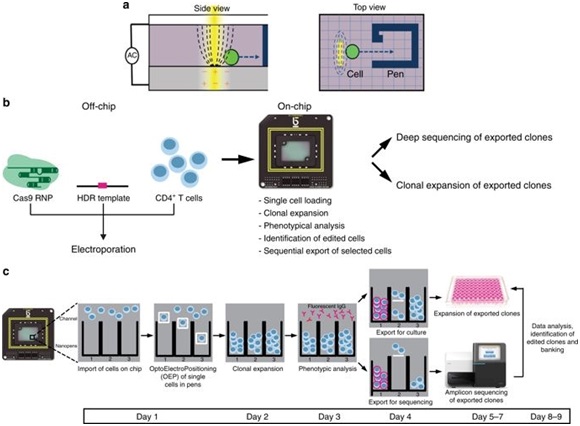|
|
|
|
|
在纳米流体装置上使用光活化细胞识别和分选(LACIS)法挑选基因编辑过的克隆 |
|
|
论文标题:Light-activated cell identification and sorting (LACIS) for selection of edited clones on a nanofluidic device
期刊:Communications Biology
作者:Annamaria Mocciaro, Theodore L. Roth, Hayley M. Bennett, Magali Soumillon, Abhik Shah, Joseph Hiatt, Kevin Chapman, Alexander Marson, Gregory Lavieu
发表时间:2018/05/03
数字识别码:10.1038/s42003-018-0034-6
原文链接:http://t.cn/EyKPb8S
尽管CRISPR分子工具箱有所改进,鉴定和纯化正确编辑的细胞克隆仍然效率低下,费力且低产。近日,《通讯-生物学》发表的一项研究Light-activated cell identification and sorting (LACIS) for selection of edited clones on a nanofluidic device提出了一种新的方法。
加州大学旧金山分校的Alexander Marson、Berkeley Lights的Gregory Lavieu及其同事发明的新方法使用光电定位技术在纳米流体设备上进行单细胞操作,从而实现对正确编辑的细胞克隆的分离、分选和扩增。简单来说,就是使用以CXCR4为靶细胞的Cas9核糖核蛋白对原代T细胞进行电穿孔,进而实现在芯片上将单个T细胞分离并使其扩增成集落。他们通过CXCR4细胞表面染色在芯片上快速进行编辑表型结果评估。此外,细胞集落会根据基因型进一步被识别区分。细胞集落会被依次分离,从芯片上转移下来单独进行靶标测序,细胞克隆测序结果得到验证后会进行芯片外扩增。
这种方法能够在Cas9核糖核蛋白引入细胞后10天之内评估单个克隆基因编辑效率,包括单、双等位基因插入/缺失或精确核苷酸替换的速度。

图1:高精度识别和分选基因编辑细胞的方法
摘要:Despite improvements in the CRISPR molecular toolbox, identifying and purifying properly edited clones remains slow, laborious, and low-yield. Here, we establish a method to enable clonal isolation, selection, and expansion of properly edited cells, using OptoElectroPositioning technology for single-cell manipulation on a nanofluidic device. Briefly, after electroporation of primary T cells with CXCR4-targeting Cas9 ribonucleoproteins, single T cells are isolated on a chip and expanded into colonies. Phenotypic consequences of editing are rapidly assessed on-chip with cell-surface staining for CXCR4. Furthermore, individual colonies are identified based on their specific genotype. Each colony is split and sequentially exported for on-target sequencing and further off-chip clonal expansion of the validated clones. Using this method, single-clone editing efficiencies, including the rate of mono- and bi-allelic indels or precise nucleotide replacements, can be assessed within 10 days from Cas9 ribonucleoprotein introduction in cells.
阅读论文全文请访问:http://t.cn/EyKPb8S
期刊介绍:Communications Biology(https://www.nature.com/commsbio/) is an open access journal from Nature Research publishing high-quality research, reviews and commentary in all areas of the biological sciences. Research papers published by the journal represent significant advances bringing new biological insight to a specialized area of research.
来源:科学网
特别声明:本文转载仅仅是出于传播信息的需要,并不意味着代表本网站观点或证实其内容的真实性;如其他媒体、网站或个人从本网站转载使用,须保留本网站注明的“来源”,并自负版权等法律责任;作者如果不希望被转载或者联系转载稿费等事宜,请与我们接洽。